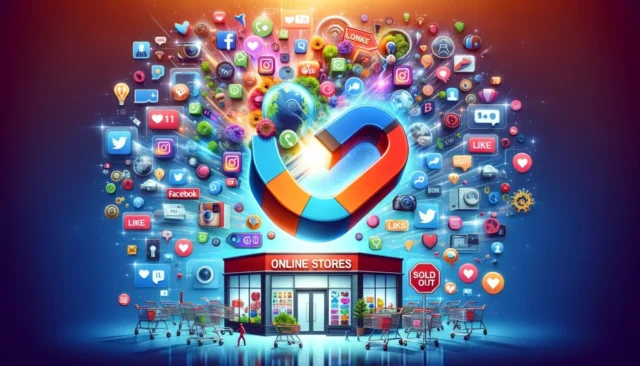In the digital age, e-commerce stores face a unique set of challenges and opportunities. With millions of businesses vying for consumer attention, social media marketing has emerged as a critical component for driving sales, building brand awareness, and fostering customer loyalty. Here’s why social media marketing is essential for e-commerce stores.

1. Building Brand Awareness
Social media platforms provide an unparalleled opportunity for e-commerce stores to increase their visibility and reach:
- Wider Audience Reach: With billions of users on platforms like Facebook, Instagram, and Twitter, e-commerce stores can engage with a vast audience, introducing their products to potential customers worldwide.
- Content Sharing: Engaging content, such as videos, images, and infographics, encourages users to share, amplifying brand awareness and helping businesses reach a broader audience.
2. Driving Traffic to Online Stores
Social media is a powerful driver of traffic to e-commerce websites:
- Direct Links: By sharing links to products or special offers on social media, e-commerce stores can guide potential customers directly to their websites, increasing the likelihood of conversions.
- Promotional Campaigns: Targeted ads and promotions on social media can attract customers and lead them to the store, boosting website traffic and sales.
3. Enhancing Customer Engagement
Engaging with customers on social media creates a sense of community and loyalty:
- Two-Way Communication: Social media enables e-commerce stores to interact with customers directly, addressing queries, concerns, and feedback in real time.
- Building Relationships: Regular engagement through comments, messages, and posts helps build relationships, turning one-time buyers into loyal customers.
4. Showcasing Products Effectively
Social media platforms are ideal for visually showcasing products:
- High-Quality Visual Content: E-commerce stores can share stunning product images and videos that highlight features and benefits, attracting potential buyers.
- User-Generated Content: Encouraging customers to share photos of themselves using products can enhance credibility and serve as authentic endorsements.
5. Influencer Marketing Opportunities
Collaborating with influencers can boost an e-commerce store’s visibility and credibility:
- Authentic Recommendations: Influencers have established trust with their followers. Partnering with them allows e-commerce stores to reach targeted audiences through authentic endorsements.
- Expanded Reach: Influencers can introduce brands to new audiences, driving traffic and sales through their platforms.
6. Targeted Advertising
Social media platforms offer advanced targeting options for advertising, making it easier for e-commerce stores to reach their ideal customers:
- Custom Audiences: Businesses can create custom audiences based on demographics, interests, and behaviors, ensuring that ads reach the most relevant users.
- Retargeting: Retargeting ads allow e-commerce stores to reach users who have previously interacted with their website, reminding them of products they may have forgotten about.
7. Cost-Effective Marketing
Social media marketing can be more cost-effective than traditional marketing methods:
- Affordable Advertising: Many social media platforms offer budget-friendly advertising options, allowing e-commerce stores to reach a large audience without breaking the bank.
- Organic Growth Opportunities: With engaging content, brands can grow their audience organically without spending on ads.
8. Gathering Customer Insights
Social media provides valuable insights into customer preferences and behaviors:
- Analytics Tools: Most platforms offer analytics tools that allow e-commerce stores to track engagement, reach, and conversion rates, helping them refine their marketing strategies.
- Customer Feedback: Social media is an excellent channel for gathering feedback and understanding customer needs, allowing businesses to make informed decisions about product offerings and improvements.
9. Boosting SEO Efforts
While social media does not directly influence search engine rankings, it plays a significant role in supporting SEO efforts:
- Increased Visibility: Social media activity can drive traffic to the e-commerce store, signaling to search engines that the brand is relevant and popular.
- Content Sharing: Shared content on social media can generate backlinks and improve the store’s online presence, enhancing its SEO strategy.
10. Fostering Customer Loyalty
Social media marketing helps cultivate customer loyalty through consistent engagement:
- Exclusive Offers: Sharing exclusive promotions, discounts, or early access to sales with social media followers encourages loyalty and repeat purchases.
- Community Building: Creating a sense of community among customers fosters loyalty, as they feel connected to the brand and its values.
Conclusion
In today’s competitive e-commerce landscape, social media marketing is not just an option; it’s a necessity. By leveraging social media platforms to build brand awareness, drive traffic, enhance customer engagement, and gather insights, e-commerce stores can achieve sustainable growth and success.


No responses yet